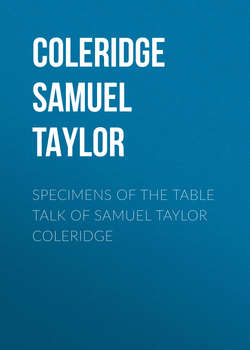Читать книгу Specimens of the Table Talk of Samuel Taylor Coleridge - Coleridge Samuel Taylor - Страница 22
TABLE TALK
March 18. 1827
ОглавлениеPARTS OF SPEECH.—GRAMMAR
There are seven parts of speech, and they agree with the five grand and universal divisions into which all things finite, by which I mean to exclude the idea of God, will be found to fall; that is, as you will often see it stated in my writings, especially in the Aids to Reflection23:—
Prothesis.
1.
Thesis. Mesothesis. Antithesis.
2. 4. 3.
Synthesis.
5.
Conceive it thus:—
1. Prothesis, the noun-verb, or verb-substantive, I am, which is the previous form, and implies identity of being and act.
2. Thesis, the noun.
3. Antithesis, the verb.
Note, each of these may be converted; that is, they are only opposed to each other.
4. Mesothesis, the infinitive mood, or the indifference of the verb and noun, it being either the one or the other, or both at the same time, in different relations.
5. Synthesis, the participle, or the community of verb and noun; being and acting at once.
Now, modify the noun by the verb, that is, by an act, and you have—
6. The adnoun, or adjective.
Modify the verb by the noun, that is, by being, and you have—
7. The adverb.
Interjections are parts of sound, not of speech. Conjunctions are the same as prepositions; but they are prefixed to a sentence, or to a member of a sentence, instead of to a single word.
The inflections of nouns are modifications as to place; the inflections of verbs, as to time.
The genitive case denotes dependence; the dative, transmission. It is absurd to talk of verbs governing. In Thucydides, I believe, every case has been found absolute.24
Dative:—[Greek: –]
Thuc.VIII. 24. This is the Latin usage.
Accusative.—I do not remember an instance of the proper accusative absolute in Thucydides; but it seems not uncommon in other authors: [Greek: –]
Yet all such instances may be nominatives; for I cannot find an example of the accusative absolute in the masculine or feminine gender, where the difference of inflexion would show the case.—ED.]
The inflections of the tenses of a verb are formed by adjuncts of the verb substantive. In Greek it is obvious. The E is the prefix significative of a past time.
23
P. 170. 2d edition.
24
Nominative absolute:—[Greek: theon de phozos ae anthropon nomos, oudeis apeirge, to men krinontes en homoio kai sezein kai mae—ton de hamartaematon.]—Thuc. II. 53.
